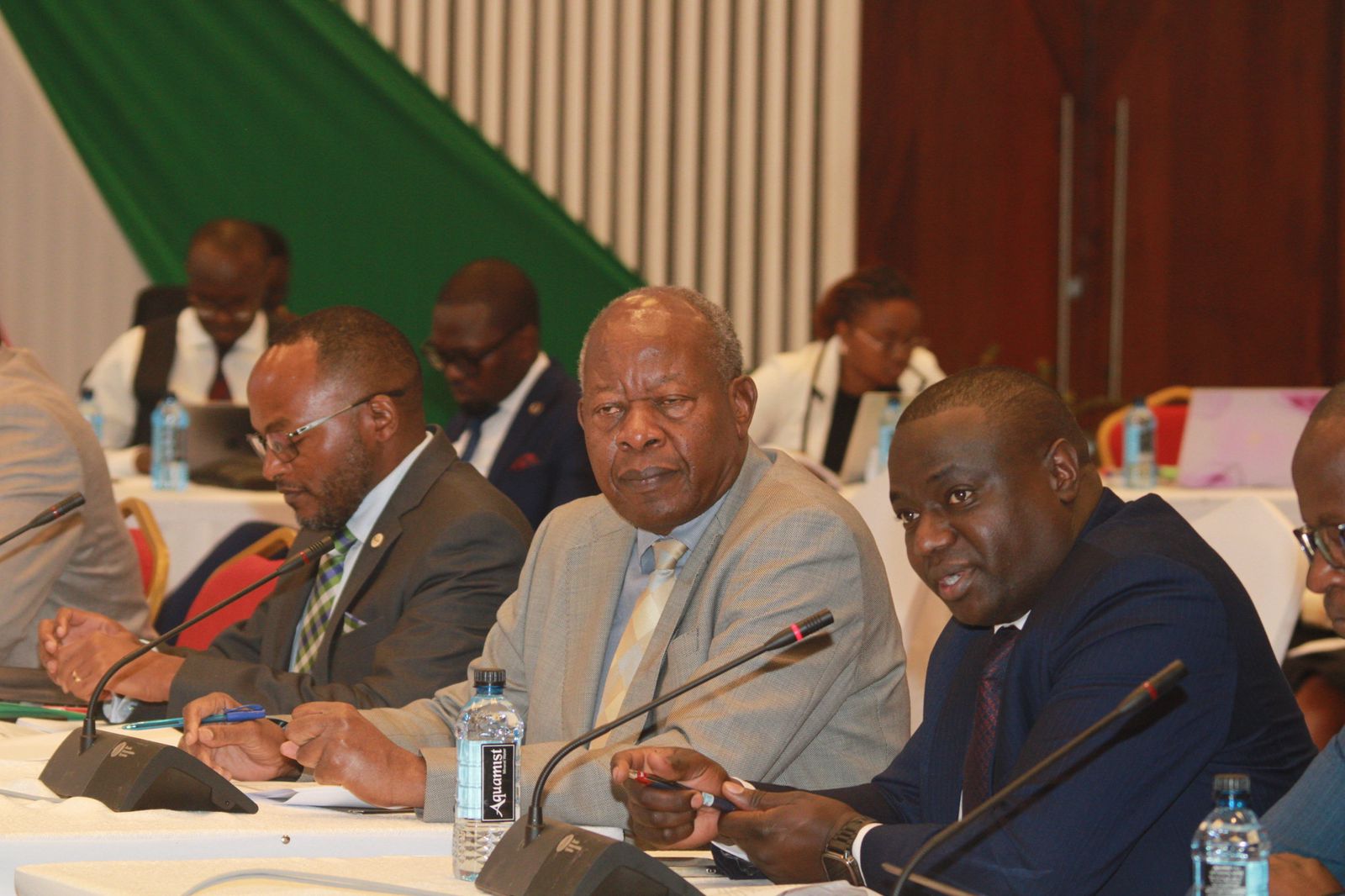
ICPAK director Public Policy and Reserch Hillary Onami, Public Finance and Tax committee member FCPA Erastus Kwaka and the Committe convenor FCPA Robert Waruiru during Finance Bill 2025 proposals submission/ HANDOUT
THE Institute of Certified Public Accountants of Kenya has proposed several tax cuts and scrapping of others to stimulate industrial growth and boost household earnings.
This comes as the Finance Bill 2025, currently under the public participation stage, shows a move away from the tax incentives that have previously distorted the market, with no clear output registered in the economy, in a tough balancing act by Treasury that has seen it go slow on imposing major taxes.
Among taxes the accountants body wants streamlined includes VAT, corporate and excise tax on key locally produced products which they either ant reduced or completely removed.
In its submission to the National Assembly on the Finance Bill 2025, ICPAK recommends a reduction of the corporate income tax rate from 30 per cent to 28 per cent, saying it ensure Kenya aligns its tax rate with global and regional trends.
Presently, the average global corporate tax rate is 23.51 per cent, while in Africa, it is 27.28 per cent.
“…Enhance Kenya’s strategic position as an investment hub; and to deter aggressive tax planning and lobbying strategies aimed at reducing corporate tax liability, a reduced corporate tax rate would be beneficial and ecourage more taxpayers to voluntarily comply with their tax obligations,” ICPAK led by director Public Policy and Reserch Hillary Onami, Public Finance and Tax committee member FCPA Erastus Kwaka and the Committee convenor FCPA Robert Waruiru.
Further, noting that recent measures undertaken by the government to boost tax compliance, such as eTIMS, have had less than optimal impact on revenue collection, encouraging voluntary tax compliance may be the key to shoring up revenue mobilisation, it said.
Accountants also want the proposed introduction of a five-year cap on deductibility of tax losses reviewed upwards to 15 years.
Currently, the law permits taxpayers to carry forward losses
indefinitely where its removal
was based on introduction of minimum
tax.
Tax loss carry forward is a tax provision that allows firms to carry forward losses from prior years to offset future profits, and, therefore, lower future income taxes.
Since the current practice is that tax losses can be carried forward indefinitely, introducing a 15-year cap would be more reasonable since some of the tax losses arise from the investment allowances legitimately provided for under the Income Tax Act, according to ICPAK.
“By the time the investment allowance is utilised fully, a company would have likely not exhausted the tax losses because five years is too short for capital-intensive projects,” ICPAK has noted.
It further wants a framework put in place to implement the proposed Advance Pricing Agreements (APAs) for non-residents to effectively promotes tax certainty and minimises disputes.
This is an ahead-of-time deal between a company and a tax
authority that predetermines the method for pricing transactions between
related parties, such as different branches or
subsidiaries of the same company operating in various countries.
If implemented, Kenya would join regional counterparts such as Tanzania, Uganda, and Rwanda, which already have provisions for APAs in their tax laws.
However, regional experience shows that only a limited number of APAs have been finalized so far, largely due to administrative capacity constraints, unclear procedures and limited interest from taxpayers.
The Bill also proposes to amend the Income Tax Act by extending the period of approval of income tax exemption applications from 60 days to 90 days, with the institute recommending the current provision retained.
It further proposes to repeal the preferential income tax rate of 15 per cent to companies that construct 100 residential units.
On this, ICPAK recommends the retention of the current provision in the Act saying the repeal of the incentive goes against the housing agenda which is a key economic agenda under the Bottom-Up Economic Transformation Agenda (BETA).
“The proposed amendment will disincentivise investment in the real estate sector. The incentive was designed to encourage developers to build at least 100 residential units annually, supporting Kenya’s affordable housing agenda. Removing this incentive may reduce the financial attractiveness of such projects, potentially leading to fewer large-scale developments and slowing the supply of affordable housing,” it said.
Other recommendations by ICPAK includes reduction of VAT rate to 15 per cent in first year and then gradually to 14 per cent.
“The 16 per cent VAT rate in the current stressed economy and high living cost has not only reduced consumption levels but also limited revenue potential for the government. The medium-term revenue strategy anticipates an eventual lower rate of 14 per cent to cushion the economy and improve purchasing power after increased disposable income,” it said.
To promote local industries, accountants want tax incentives on local vehicle assemblers retained, excise duty on locally manufactured articles of plastics removed to promote locally industries and harmonisation of key tax policies including in health, energy sectors and motorcycle assembly and removal of excise duties and other domestic taxes on locally produced or imported industrial inputs.
According to the KNBS Economic Survey 2025, the manufacturing sector in Kenya experienced moderate growth in 2024, with an increase of 2.8 per cent compared to 2.2 per cent in 2023.
The sector's contribution to the Gross Domestic Product
(GDP) stood at 7.3 per cent
in 2024 down from 7.5 per cent
in 2023.
Kenya Association of Manufactures has been calling for implementation of the National Tax Policy, which is part of the government's efforts to enhance transparency in tax policies.












